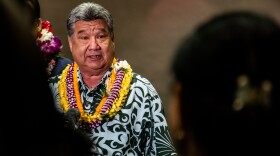Lawmakers will see a 'clean elections' proposal next week, at the start of the state legislative session.
Clean elections are often used to increase eligibility for public campaign financing. That's when private campaign donations can be matched with public taxpayer money for use by candidates who follow specific rules and guidelines.
The hope is that this would allow candidates to compete in elections without relying solely on private donations.
The bill, which will be introduced by state Sen. Karl Rhoads, is a model that was used in county council races on Hawaiʻi Island in 2010 and 2012, as well as in Maine and Connecticut.
Rhoads said Monday that the proposal will be much more comprehensive than the current partial public finance system.
"This is important to combat private, big money contributions that pour into campaigns," Rhoads said. "Publicly funded elections are in voters best interests."
"Political career should be completely dependent on voters, not special interest money," he said.
The Commission to Improve Standards of Conduct was formed last year following the corruption scandals of former state Sen. J. Kalani English and state Rep. T.J. Cullen. They have issued recommendations and draft legislation that are set to be introduced this session.
Rhoads said more needs to be done.
"None of [the bills and recommendations] really get to the heart of the matter, which is the large sums of special interest money that currently pour into campaigns," Rhoads said.
A statewide clean elections bill died in conference committee in 2013.
Under this proposed bill, which will likely see several amendments as it makes its way through this year's state legislative session, would require a race-specified number of qualifying donations to receive public funds.
For example, a candidate for the state House would need 100 $5 donations before being able to receive $50,000 in public funds. In a race for governor, a candidate would need 6,250 qualifying donations to unlock $2.5 million.
Advocates for the bill say the model would cost taxpayers less than $25 million annually.






